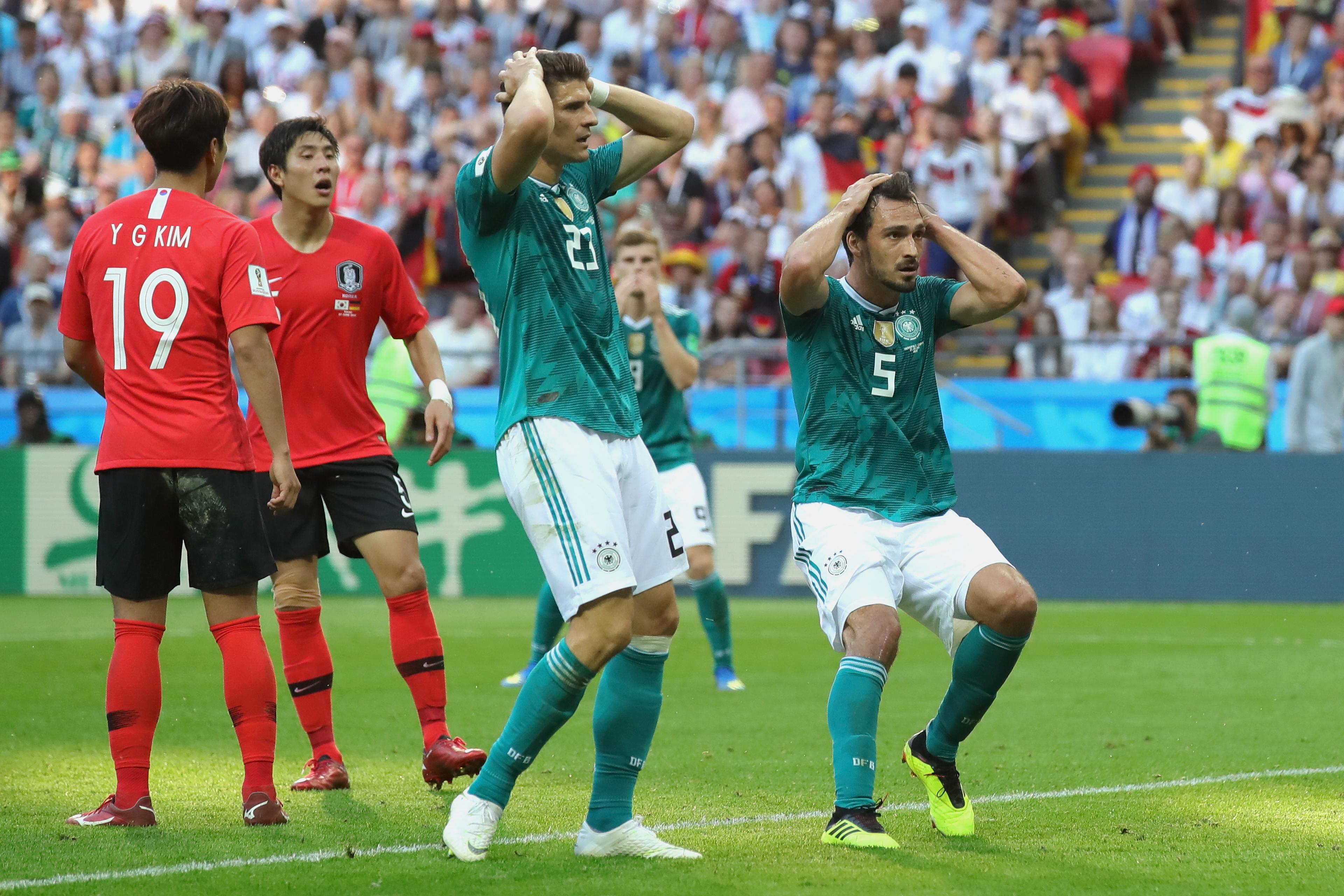
It happened to France in 2002. To Italy in 2010. To Spain in 2014. And now, to Germany. On Wednesday, Joachim Löw’s squad became the fourth defending champions in the past five World Cups to lose in the group stage after a 2–0 loss to South Korea.
Coming into the day, Germany and Mexico controlled their own destinies in Group F. After Toni Kroos’s 94th-minute winner against Sweden on Saturday, Die Mannschaft sat in second place, needing only a better result against South Korea than the Swedes did against group leaders Mexico to advance. And as long as Germany didn’t win and El Tri didn’t lose to Sweden by more than two goals, the North American stalwarts would see the next round, too. At halftime in both games, the scoreboards in Kazan and Yekaterinburg both showed goose eggs, but it still seemed like the favorites were in good position to move on. Despite tinkering with their first XI yet again — Thomas Müller came off the pine, but Mesut Özil and Leon Goretzka started — Germany outshot South Korea 8-to-5 and held more than 75 percent of possession in the first half, while Mexico held similar advantages over their Scandinavian foes.
Just after the break, Ludwig Augustinsson gave Sweden their first goal, launching a close-range strike past Guillermo Ochoa and shooting the Swedes up into second place in the group. Twelve minutes later, an Andreas Granqvist penalty put them up two goals and into first position. And when Edson Álvarez mishandled a deflection off a long throw-in for an own goal a few minutes later, Sweden led 3–0, as they would at game’s end.
While the Swedes dominated in Yekaterinburg, a German goal seemed inevitable in Kazan, just as it had in their previous game. Just one tally would have put Germany into the next round over Mexico, but Kim Young-gwon had other plans. After fighting off a number of German chances, the Korean center back tapped in a ball inside the 6-yard box in the 94th minute past the outstretched arms of Manuel Neuer. After a lengthy VAR check, it was confirmed that South Korea was indeed ahead. And three minutes later, forward Son Heung-min scored an empty-netter to double their lead.
Germany had their chances: Mats Hummels alone squandered three point-blank attempts in the last quarter of action, and missed a fourth inside the box for good measure. His teammates weren’t much help either, as Kroos missed a close-range attempt in the 49th, and a great save by Jo Hyeon-woo kept Goretzka off the score sheet in the 46th. The final whistle confirmed the (almost) unthinkable. Sweden and Mexico were through. Germany was out.
It’s difficult to quantify how great a disaster this is for Die Mannschaft. Never before had Germany (or West Germany) bowed out in the group stages, and only once before, in 1938, did they fall in the opening round (before the tournament added the group stage). In the past four World Cups, and 13 of the previous 18 for which they’d qualified, Germany reached the semifinals. Four of those finished with the German national anthem playing during the trophy ceremony, and four more with the Germans watching solemnly as their foes played theirs.
The team’s recent success was the result of meticulous planning and precise execution. After winning the World Cup in 1990, Germany bowed out in the quarterfinals in 1994 and 1998. They were bidding for the rights to host in 2006, and fielding a subpar squad with the eyes of the world on their country seemed unacceptable. Something had to be done. So the Germans developed a blueprint for success: The FA turned its focus to youth development. They teamed up with clubs to build dozens of training facilities and academies across the country, giving athletes who weren’t accepted to the big-name teams a second chance. And it paid off: The pipeline of young talent flowed stronger than ever.
In 2002, a German squad bolstered by newcomers made it to the final before losing to Brazil. In 2006 and 2010, the kids carried Germany to third-place finishes. And in 2014, they won their first title since the playing days of Jürgen Klinsmann — one of the architects of the systemic overhaul.
This summer’s collapse will likely draw calls for another total revamp. The decision to leave Leroy Sané — one of the world’s best counterattackers, and the piece that could have salvaged Germany’s campaign — at home now looks like the first sign that Jogi Löw’s team was destined for failure. Never before in the modern era has Germany moved through a tournament so listlessly. The tepid play from once-stalwart midfielders, forwards, and defenders seemed like an out-of-character blip against Mexico, a troubling trend against Sweden, and a harsh new reality against South Korea. Wednesday’s game will likely mark the last with Löw in charge of the national team, and while his legacy will be remembered fondly for the successes he brought the federation, this failure will forever stand as a black mark on his tenure.
While German fans are languishing, Swedish supporters are surely celebrating. The Scandinavians’ win gave them a group victory for the first time since 2002, and sent them through to the round of 16 for the first time since 2006. Barring any more surprises, they’ll face Switzerland in the knockout stage on July 3, though it’s not out of the realm of possibility that their next tie will be against Brazil, in a rematch of the 1958 World Cup final. Mexico entered the day with a good chance of finally breaking their streak of round of 16 losses, but by finishing second, they’ll likely draw the Brazilians. In most tournaments, that might mean a guarantee of a seventh consecutive round of 16 knockout. But if this World Cup has taught us anything, it’s that nothing is for certain.
